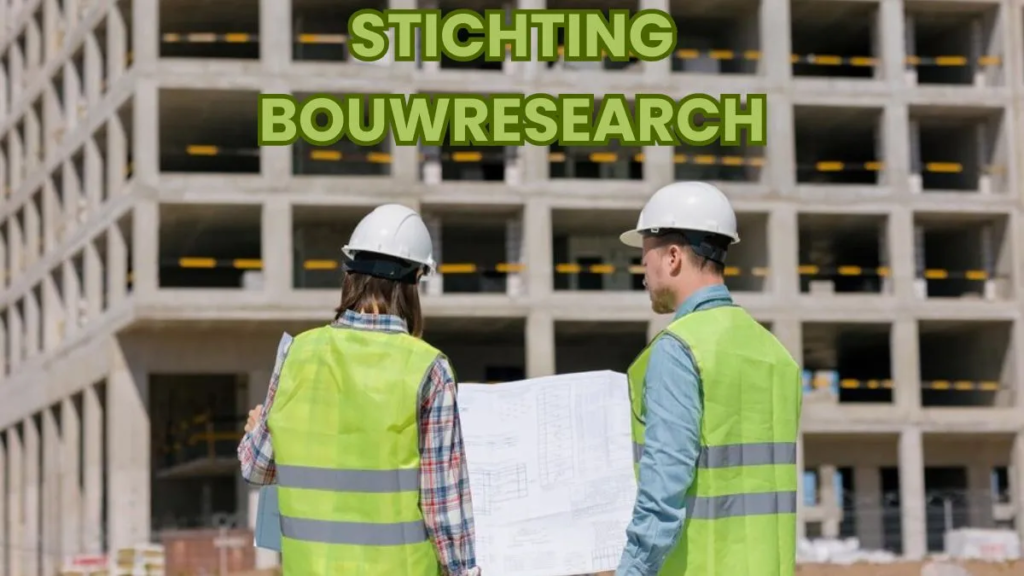The construction industry is a dynamic and complex sector that plays a crucial role in shaping the built environment. In the Netherlands, a country renowned for its innovative infrastructure and architectural achievements, the construction sector is a vital component of the economy. Within this context, Stichting Research (SBR) has emerged as a significant player, contributing to the advancement of the Dutch construction industry through research, innovation, and the dissemination of knowledge. This article delves into the history, mission, and impact of Stichting research, exploring how it has elevated Dutch construction to new heights.
The Genesis of Stichting Bouwresearch
Stichting Research, or SBR, was established in the mid-20th century, a period marked by post-war reconstruction and rapid urbanization in the Netherlands. The foundation was created with a clear mission: to support and advance the construction industry through research and the development of practical solutions that could address the challenges facing the sector. In its early years, SBR focused on providing the Dutch construction industry with the tools and knowledge necessary to rebuild the nation after the devastation of World War II.
The foundation’s establishment was driven by a growing recognition of the need for a centralized body that could bridge the gap between academic research and practical application in the construction industry. At a time when the Netherlands was experiencing a building boom, there was a pressing need for innovative approaches to construction that could enhance efficiency, sustainability, and safety. SBR was created to fulfill this need, positioning itself as a key partner for construction professionals, researchers, and policymakers.
The Role of SBR in Promoting Innovation
One of the core functions of Stichting Research has been to promote innovation within the Dutch construction industry. Over the years, SBR has undertaken numerous research projects aimed at developing new building techniques, materials, and processes. These projects have often been carried out in collaboration with universities, research institutes, and industry stakeholders, ensuring that the outcomes are both scientifically rigorous and practically applicable.

SBR’s commitment to innovation is evident in its focus on sustainability and energy efficiency, two areas that have become increasingly important in the construction industry. The foundation has been at the forefront of research into sustainable building practices, advocating for the adoption of energy-efficient technologies and materials that reduce the environmental impact of construction. Through its research, SBR has contributed to the development of guidelines and standards that have been widely adopted across the industry, helping to shape a more sustainable built environment in the Netherlands.
One of the notable contributions of SBR in this regard is its work on the development of energy-neutral buildings. As part of its mission to promote sustainable construction, SBR has supported research into the design and construction of buildings that produce as much energy as they consume. This research has led to the creation of practical tools and guidelines that architects, engineers, and builders can use to design and construct energy-neutral buildings. These efforts have not only helped to reduce the carbon footprint of new constructions but have also positioned the Netherlands as a leader in sustainable building practices.
Knowledge Dissemination: SBR’s Educational Initiatives
In addition to its research activities, Stichting Research has played a crucial role in disseminating knowledge to the wider construction community. The foundation recognizes that the impact of research can only be fully realized if it is effectively communicated and applied in practice. To this end, SBR has developed a range of educational initiatives aimed at providing construction professionals with the latest information and best practices.
One of the key ways in which SBR disseminates knowledge is through the publication of technical guides and handbooks. These publications cover a wide range of topics, from building physics and structural engineering to sustainability and construction management. They are designed to be practical tools that construction professionals can use in their day-to-day work, helping them to stay informed about the latest developments in the industry.
SBR has also been active in organizing workshops, seminars, and conferences that bring together experts from across the construction sector. These events provide a platform for the exchange of ideas and the sharing of knowledge, fostering collaboration and innovation. By facilitating dialogue between researchers, practitioners, and policymakers, SBR has helped to ensure that the latest research findings are translated into practice, ultimately benefiting the entire construction industry.
Furthermore, SBR has developed online resources and e-learning platforms that make its knowledge base accessible to a wider audience. These digital tools have become increasingly important in recent years as more construction professionals seek flexible and convenient ways to stay up-to-date with industry trends and advancements. Through its educational initiatives, SBR has contributed to the continuous professional development of construction workers, engineers, architects, and other industry stakeholders.
SBR and the Development of Industry Standards
Another significant contribution of Stichting’s research has been its role in the development of industry standards. Standards play a critical role in the construction industry, providing a framework for ensuring quality, safety, and consistency in building practices. SBR has been actively involved in the creation and updating of standards that are used across the Dutch construction sector.
SBR’s involvement in standardization efforts can be traced back to its early years when it began working on guidelines for various aspects of construction, including structural design, building materials, and construction processes. These guidelines were based on rigorous research and were developed in collaboration with industry experts and regulatory bodies. Over time, many of these guidelines were adopted as official standards, helping to improve the quality and safety of construction projects across the Netherlands.

One of the areas where SBR has made a significant impact is in the standardization of sustainable building practices. As the demand for green buildings has grown, there has been a need for clear and consistent standards that define what constitutes a sustainable building. SBR has been instrumental in developing these standards, working with industry stakeholders to create guidelines that promote the use of environmentally friendly materials, energy-efficient technologies, and sustainable construction methods.
The foundation’s work in standardization has not only improved the quality of construction projects but has also helped to level the playing field for smaller companies that may not have the resources to develop their guidelines. By providing a set of clear and widely accepted standards, SBR has helped to ensure that all companies, regardless of size, can compete on an equal footing in the marketplace.
Collaborations and Partnerships
Stichting Bouwresearch’s success in advancing the Dutch construction industry can be attributed in large part to its ability to forge strong collaborations and partnerships. Recognizing that the challenges facing the construction sector are complex and multifaceted, SBR has worked closely with a wide range of stakeholders, including government agencies, academic institutions, industry associations, and private companies.
These collaborations have enabled SBR to draw on a diverse pool of expertise and resources, enhancing the impact of its research and educational initiatives. For example, SBR has partnered with universities and research institutes to conduct cutting-edge research on topics such as building physics, materials science, and energy efficiency. These partnerships have not only advanced the state of knowledge in these fields but have also provided valuable opportunities for knowledge transfer between academia and industry.
SBR has also worked closely with government agencies to influence policy and regulatory frameworks that affect the construction industry. By providing evidence-based recommendations and insights, SBR has helped to shape policies that promote innovation, sustainability, and safety in construction. These efforts have been particularly important in the context of the Netherlands’ ambitious climate goals, where the construction industry plays a key role in reducing greenhouse gas emissions and achieving energy efficiency targets.
In addition to its partnerships with academic and government institutions, SBR has collaborated with industry associations and private companies to develop practical solutions to real-world challenges. These collaborations have resulted in the creation of innovative products, processes, and tools that have been widely adopted across the construction sector. By working closely with industry partners, SBR has ensured that its research is not only theoretically sound but also practically relevant and impactful.
The Future of Stichting Bouwresearch
As the construction industry continues to evolve, Stichting Research is poised to play an increasingly important role in shaping its future. The challenges facing the sector today are as complex as ever, with issues such as climate change, resource scarcity, and urbanization requiring innovative solutions and a forward-thinking approach. SBR is well-positioned to address these challenges, drawing on its decades of experience and its extensive network of collaborators.
Looking ahead, SBR is likely to continue its focus on sustainability, with an emphasis on developing new technologies and materials that can reduce the environmental impact of construction. The foundation is also expected to expand its efforts in the area of digitalization, exploring how emerging technologies such as Building Information Modeling (BIM), artificial intelligence, and robotics can be harnessed to improve efficiency and productivity in construction.
In addition to its research and innovation activities, SBR is likely to continue its work in education and knowledge dissemination, ensuring that the construction industry remains well-informed and capable of meeting the challenges of the future. It will include the development of new educational resources and the organization of events that foster collaboration and the exchange of ideas.
Moreover, SBR’s role in standardization is likely to become even more important as the construction industry grapples with the need for greater consistency and quality in building practices. As new technologies and materials are introduced, there will be a need for updated standards that ensure their safe and effective use. SBR’s expertise in this area will be invaluable in helping the industry navigate these changes.
Conclusion
Stichting Research has played a pivotal role in elevating the Dutch construction industry, driving innovation, and promoting best practices that have had a lasting impact on the built environment. Through its research, educational initiatives, and collaborations, SBR has helped to shape a construction sector that is not only efficient and productive but also sustainable and forward-looking. As the industry continues to evolve, SBR’s contributions will remain essential in addressing the challenges and opportunities that lie ahead. The foundation’s commitment to advancing knowledge and fostering collaboration ensures that it will continue to be a key player in the ongoing development of the Dutch construction industry, guiding it towards a future that is both innovative and sustainable.














Leave a Reply